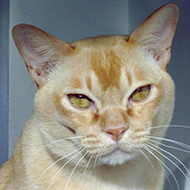
Further cats called for involvement following initial success.
The Royal Veterinary College (RVC) is seeking diabetic cats to take part in a feline diabetes diet research trial.
Researchers are seeking cats in Hertfordshire, Bedfordshire, Buckinghamshire and London to take part in the study, which aims to provide a new form of treatment for diabetic cats.
The treatment uses supervised caloric restriction to help cats revert to a non-diabetic state and be able to stop insulin therapy.
Taking place over 12 months, the study will see each cat attend between five and seven outpatient appointments at the RVC Queen Mother Hospital for Animals in Hertfordshire, with additional monitoring carried out by owners.
Cats eligible for the trial will need to have been diagnosed with diabetes mellitus in the last two years, have a body condition score of six out of nine or above, and are currently being treated with insulin twice daily.
“The study has already proved incredibly successful; since it began, recruited cats have recorded a diabetic remission rate of approximately 75 per cent; an outstanding result compared to what is typically reported for diabetic cats,” said Dr Ruth Gostelow, lecturer in small animal internal medicine at the RVC.
“The early success of the trial means we want to expand it, and now we need more vets and their cat owners to sign up.
"Although some cats will remain diabetic for the duration of their life, a proportion can achieve diabetic remission and stop insulin treatment. Achieving diabetic remission significantly increases their life expectancy, and owner and pet wellbeing."
Owners who join the trial will receive free underlying disease screening for their cats, free cat food for the duration of the trial, free home blood glucose monitoring supplies, glucose monitoring cat litter and dedicated diabetic care from the RVC.
One cat who has benefited from the RVC's diabetes research is three-year-old Lester Fortescue, who took part in the trial in November 2021.
Lester's owner Rachel Fortescue said: “As soon as Lester was diagnosed with diabetes, I knew I had to do everything for him. Enrolling him on the RVC diabetic remission trial was the best thing I could have possibly done! The team have been so supportive and caring, truly understanding my anxieties and worries in how best to manage this condition.
“Having the RVC holding my hand through this journey has been absolutely invaluable and I have no doubt that Lester's early remission would not have happened if he had not been on the trial. I have watched Lester turn back into a happy, affectionate, playful cat again as the symptoms of his diabetes have disappeared and for that I am eternally grateful."
General practice veterinary surgeons and cat owners can apply for the trial by emailing fdrc@rvc.ac.uk or calling 01707 666605.
Further information about the research can be found here.
Image (C) Royal Veterinary College



 The Veterinary Medicines Directorate (VMD) is inviting applications from veterinary students to attend a one-week extramural studies (EMS) placement in July 2026.
The Veterinary Medicines Directorate (VMD) is inviting applications from veterinary students to attend a one-week extramural studies (EMS) placement in July 2026.